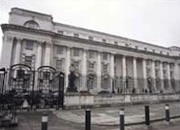
On Friday last week, following a lengthy legal battle, three men were told that Crown prosecutors were no longer willing to stand over their convictions for offences as teenagers.
The unsafe convictions of Peter McDonald, Eric Wright and James Brown are expected to be officially quashed during an appeal court hearing to be held later this month.
Hundreds of juveniles convicted through the Diplock court system could now be eligible to have their sentences overturned because of a number of legal rulings.
However, the landmark decision comes too late for Mr McDonald’s chidhood friend, Johnny Doherty, who died in tragic circumstances shortly after his release from prison.
He was found dead in a forest almost two weeks after he went missing while returning from a night out.
The Derry friends had spent a year and three months remanded in the youth wing of Crumlin Road prison while awaiting trail.
When they finally appeared before the juryless Diplock court, despite protestation from their lawyer that confessions had been signed in disputed circumstances, both were found guilty.
Their cases were recently referred back to the Court of the Appeal by the Criminal Cases Review Commission due to breaches of Judge’s Rules in operation at the time.
In Mr McDonald’s case he was sentenced to serve three years on 10 charges of conspiracy to commit an offence and membership of the Fianna, the IRA’s youth wing.
Johnny Doherty, who was just 15-years-old at the time of his arrest, was released on a conditional discharge.
On the day of their arrest the two friends had just left Mr Doherty’s mother’s home in the Creggan area of Derry when they were approached by the British army.
The two schoolboys were taken to the Strand Road Crown force base in Derry and questioned for three days without the presence of either a parent or lawyer.
“Being in jail changed me and the course of my life,” Mr McDonald said.
“When we were arrested I was slapped about and abused, verbally and mentally, despite being so young.
“In some ways I’m lucky in that I went on to meet my partner and have a family.
“Johnny never got that chance.
“I could name countless incidents when my conviction has caused me difficulties through seeking employment or when travelling.
“That’s why its been important for me personally to pursue this appeal but it was also important to posthumously clear my friend’s name as well.
“We are going through political change which I very much support and I hope that by highlighting and rectifying these historic mistakes we can make sure things like this never happen again,” he said.
Sinn Fein welcomed the decision by prosecutors not to stand over the convictions.
“I congratulate all involved in the fight to have these convictions quashed and the innocence of these men established,” said Assembly member Martina Anderson.
“The appeal process has so far succeeded in exposing what passed for a justice system during the years of conflict. It also exposes the blind eye approach adopted by most politicians who claimed the existence of collusion and corruption in the justice system was Sinn Fein propaganda.
“These cases and others to come are an indictment of the political and social establishment who chose to stay silent while these injustices were inflicted on individuals who were no more than children at the time.
“But recent developments are a tribute to the resilience of those who refused to accept the unacceptable and fought the system to have their convictions overturned.”
* Lawyers for the last man to receive the death penalty in the North of Ireland are to seek access to a secret dossier as part of attempts to overturn his conviction.
West Belfast man Liam Holden faced execution after being found guilty of killing a British soldier during the early years of the conflict.
Water torture was used to extract a confession from him. Following his conviction in April 1973 he was sentenced to death, only for the punishment to be commuted to life imprisonment soon after.
Mr Holden, from the Ballymurphy area, served 17 years in jail before applying to an independent body set up to examine alleged miscarriages of justice.
Earlier this year the Criminal Cases Review Commission referred his conviction back to the Court of Appeal on the basis that it may be unsafe.
![[Irish Republican News]](https://republican-news.org/graphics/title_gifs/rn.gif)
![[Irish Republican News]](https://republican-news.org/graphics/title_gifs/harp.gif)

